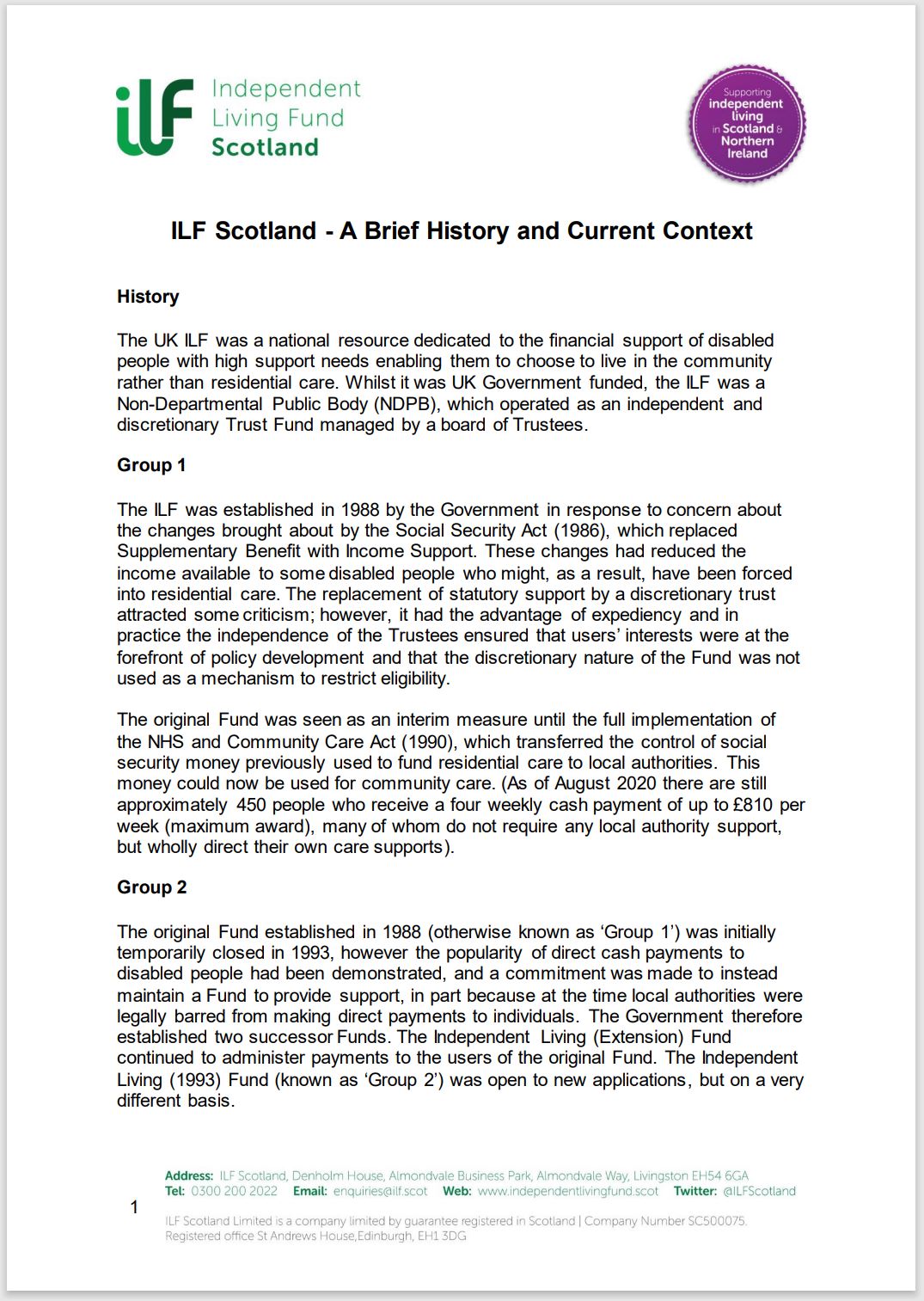
The UK ILF was a national resource dedicated to the financial support of disabled people with high support needs enabling them to choose to live in the community rather than residential care. Whilst it was UK Government funded, the ILF was a Non-Departmental Public Body (NDPB), which operated as an independent and discretionary Trust Fund managed by a board of Trustees.
The ILF was established in 1988 by the Government in response to concern about the changes brought about by the Social Security Act (1986), which replaced Supplementary Benefit with Income Support. These changes had reduced the income available to some disabled people who might, as a result, have been forced into residential care. The replacement of statutory support by a discretionary trust attracted some criticism; however, it had the advantage of expediency and in practice the independence of the Trustees ensured that users’ interests were at the forefront of policy development and that the discretionary nature of the Fund was not used as a mechanism to restrict eligibility.
The original Fund was seen as an interim measure until the full implementation of the NHS and Community Care Act (1990), which transferred the control of social security money previously used to fund residential care to local authorities. This money could now be used for community care. (As of August 2020 there are still approximately 450 people who receive a four weekly cash payment of up to £810 per week (maximum award), many of whom do not require any local authority support, but wholly direct their own care supports).
The original Fund established in 1988 (otherwise known as ‘Group 1’) was initially temporarily closed in 1993, however the popularity of direct cash payments to disabled people had been demonstrated, and a commitment was made to instead maintain a Fund to provide support, in part because at the time local authorities were legally barred from making direct payments to individuals. The Government therefore established two successor Funds. The Independent Living (Extension) Fund continued to administer payments to the users of the original Fund. The Independent Living (1993) Fund (known as ‘Group 2’) was open to new applications, but on a very different basis.
Applications had to come from a Local Authority Care Manager committing the Local Authority to providing a minimum threshold sum, which gradually increased from £200 per week to £340 per week minimum, with ILF able to match up to the Local Authority contribution to a maximum of £475 per week.
The UK ILF closed to new applications in 2010 and then closed completely in 2015.
Subsequently, the UK Government transferred funding for existing recipients to local authorities in England and to each of the devolved governments in Scotland, Northern Ireland and Wales. The Welsh Government has since decided to devolve its proportion of ILF funding to local authorities to administer.
The Scottish Government was persuaded by a strong campaign from disabled people to retain ILF and the Government agreed to establish the Independent Living Fund (ILF) Scotland to administer funding for existing recipients in Scotland.
Likewise, disabled people in Northern Ireland also campaigned for the same outcome and in July 2015 both the Scottish and Northern Irish Governments agreed that ILF Scotland would administer funding for existing ILF recipients in both Scotland and Northern Ireland.
At the point of transfer in 2015, ILF Scotland provided funding for 3,409 disabled people. As of August 2020, this number is now 2,634. The reduction in numbers is mainly due to individuals passing away, with a much smaller percentage no longer being eligible to receive funding after moving into residential care.
Social Care in Scotland and Northern Ireland is now delivered via Self Directed Support (SDS). Local Authorities have a duty to offer direct payments and other options to disabled people with eligible needs. However, the SDS roll out has arguably differed between each postcode area amongst Scotland’s 32 Health and Social Care Partnerships and Northern Ireland’s five Health and Social Care Trusts.
The eligibility for SDS funding can also differ from area to area, as well as the portability and knowledge about SDS.
ILF Scotland funding maximises SDS for disabled adults. There is a positive incentive to retain ILF additional funding, which can be up to £9m in one partnership area to complete SDS assessments, which promote independent living. ILF Scotland’s policy suite flexes across all the differences between the 32 versions of SDS in Scotland and the 5 versions in Northern Ireland. It makes payments of
different amounts for different services on an individual basis after a bi-annual assessment, which is person centred and outcomes focused.
ILF Scotland involves disabled people at the heart of the organisation in every facet of its operations and it is this which keeps us innovating and removing barriers.
ILF funding increases the portability of care packages; it reduces inconsistency and inequality of provision for disabled people and creates a dialogue for all disabled people to challenge for their best SDS outcomes.